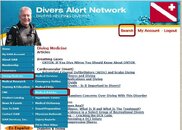Don,
If DAN says it has no benefit for most recreational divers... who am I to disagree.
My personal experience as it relates to Nitrox. I'm certified and an Instructor in it's use. I've been Nitrox Certified since 2000. I dove it in 2000 and 2001 because back then I didn't know any better. I had been convinced by my LDS I had to have it.
Then I did some research and read articles in DAN's magazine over the years and learned that it was for the most part (and lack of a better term) a bunch of fooey.
I stopped using Nitrox because it cost an extra $100 or more a week on a trip and for tanks locally it was $3 - $5 more per fill if I was diving locally. Based on what I had researched the minimal benefit or lack thereof entirely was not worth the extra investment.
I just kinda doubt that DAN used those words and would be interested to the see the article. You mentioned in a subsequent post that you
"went to the DAN website to see if there was an easy way to pull up older articles and I couldn't find a way... but they exist. If anyone knows how to find artcicles from old DAN magazines online - can you please help..."
1: Log in at DAN sites;
2: Go to Dive Medicine and Medical articles as illustrated on the pic;
3: Use Search circled in upper right.
click pic for larger view

The whole thing about Nitrox making you feel better after a dive has also been refuted by DAN. At best it has a placebo effect... and I'll agree that may be enough for some people. We all know perception can be far more powerful than reality.
So if you truly believe you feel better because you dive Nitrox - you probably do... but it has nothing to do with the Nitrox...
Cheers to "feel good" diving!
I know that part is unsupported and I don't buy it either. But I do view Nitrox as a tool, not the most commonly used one in my tool box, but one I always want in there in case I want to use it.
I've had experiences where I had to end my wreck dive early because my boat-pic air diving buddy was close to his NDL and wanted to ascend, and I always descend and ascend with my bud, whenever either of us calls the dive, no arguing. One that comes to mind was a newbie, but better on consumption that me - just out of time.
I've had experiences where the captain made all divers take a longer SI to keep the air divers safer.
I've just been posting on a thread with a diver whose GF took a hit after diving 5 air dives. Dehydration was the obvious contributing factor in that case, but vacation divers do that. Why not give them the $100 tool?
I've seen others leave in ambulances over the years.
Here in NC it is very common for off shore dives. Our dives tend to be on the deeper side and it is common for a lot of divers to be diving larger tanks- 100s and 120s are common. The combination of multiple deep dives and larger tanks easily puts us into deco without nitrox.
OP- Here is some online info on nitrox you may find interesting.
Nitrox Course Outline
Yep, for NC wreck diving I've done back to back wreck dives on Nitrox with large tanks and still went to my NDL even with my lousy consumption rate, also in the St.Lawrence and Florida. One on NC wreck I saw a diver who shouldn't have been on the boat, but it happens that they are at times, diving air with a Nitrox diver - and when he approach NDL,
they split! I don't do that, but they did - leaving her on the bottom without a buddy, him ascending alone and sure enough - his reg failed on ascent. Fortunately he caught up to another diver to donate.
Second... I'm in full agreement that successive deep dives without an adequate surface interval will require Nitrox - to avoid going into decompression mode on your computer or being told no to the dive - if you're using tables. I'm also in agreement that bottom time is limited even on your first deep dive without Nitrox.
The point being made however is that most recreational divers aren't trained for those types of dives to begin with (OW to 60ft) and most never go that deep (100ft +) at anytime in their diving careers.
I think you're just flat wrong. I see OW newbies going to 100+ft frequently on my trips. I don't mind doing 100+ft on air at all on a 2 dive day, but on a 3-dive day - I'm willing to pay even Cozumel rates for one tank of voodoo gas.
The Nitrox card was much more expensive when you and I got ours, but it's only $100 including everything now, no dives required - yet still prepares the diver to be a safer diver when it's indicated. Such a good idea and I just don't get your opposition.






